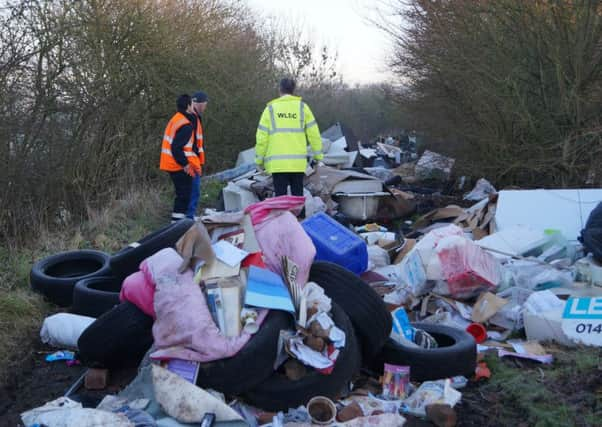Rise in West Lindsey flytipping contributes towards £480,000 clean-up costs in Lincolnshire


New figures released by the Department for the Environment, Food and Rural Affairs (DEFRA) last week show that, in West Lindsey, there has been a modest increase in fly-tipping on public land, from 944 incidents in 2015/16 up to 970 incidents in 2016/17.
Last year’s overall clear up costs to West Lindsey District Council - and local taxpayers - was £59,524.
Advertisement
Hide AdAdvertisement
Hide AdIn neighbouring East Lindsey, there were 1,528 fly-tipping incidents last year - almost 200 more than the previous year - and the cost of clearing up the mess was £66,826.
There was a larger rise in Boston (1,367, up from 969) at a cost of £103,994, while North Kesteven and South Holland’s figures remained relatively stable.
There was a slight drop in incidents in Lincoln and South Kesteven.
Overall, across Lincolnshire, there were just over 7,400 incidents in 2016/17, at a total cost of almost £480,000.
Advertisement
Hide AdAdvertisement
Hide AdThis is around one-seventh of the overall cost across the East Midlands region, which saw 63,000 incidents last year (a 22 per cent increase on the previous year), and there were more than one million incidents across England last year - at a total cost of £58m.
Every January, many local councils see a surge in fly-tipping, with rogue residents and traders dumping post-festive waste, including old Christmas trees.
Despite these high figures, William Nicholl, head of insurance specialist Lycetts’ rural division, warns that they are not a true reflection of the cost of fly-tipping in our area as the figures only account for incidents on council land, not private land.
Farmers who fall prey to fly-tippers are responsible for meeting the cost of clearing rubbish from their land themselves – at an average cost of £1,000 per incident.
Advertisement
Hide AdAdvertisement
Hide AdMr Nicholl said: “If farmers are unfortunate enough to have a fly-tipping ‘hotspot’ on their land, costs soon tot up and their business could be put in jeopardy.”
He urged farmers to take measures such as reporting suspicious vehicles, communicating with neighbours, using locks and gates where possible, and signing up to a combined farm insurance policy.
Meanwhile, householders are being reminded of their legal responsibility for disposing of their rubbish correctly - with fines of up to £5,000 in cases where rubbish is illegally deposited.
This still applies if you ask or pay a third party to collect and dispose of your waste.
• Visit www.west-lindsey.gov.uk to report fly-tipping.